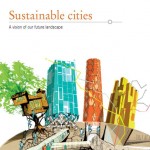Site search:
-
What’s new?
Energy for London Tags
Brent Buildings Camden Carbon Emissions CHP Cities Climate Adaptation Community Heating Community Initiatives Croydon Data DECC Decentralised Energy Distribution ECO Energy Costs Energy Efficiency Enfield FIT Fuel Poverty Funding Green Deal Hackney Haringey Housing Islington Lambeth Library Local Authorities Mayor Newham Ofgem Olympics Photovoltaics Planning RE:FIT RE:NEW Renewable Energy Retrofit Southwark Tower Hamlets Transport Waltham Forest Waste WestminsterEnergy Archives:
- February 2021 (1)
- January 2021 (15)
- December 2020 (15)
- November 2020 (9)
- October 2020 (3)
- August 2020 (5)
- July 2020 (3)
- June 2020 (4)
- April 2020 (10)
- March 2020 (5)
- February 2020 (2)
- January 2020 (3)
- October 2019 (1)
- September 2019 (4)
- August 2019 (2)
- July 2019 (1)
- August 2018 (1)
- November 2016 (8)
- October 2016 (8)
- September 2016 (2)
- August 2016 (8)
- July 2016 (14)
- April 2016 (12)
- March 2016 (16)
- February 2016 (8)
- January 2016 (4)
- December 2015 (1)
- November 2015 (1)
- October 2015 (16)
- September 2015 (3)
- June 2015 (1)
- May 2015 (1)
- April 2015 (1)
- March 2015 (1)
- February 2015 (1)
- January 2015 (1)
- December 2014 (18)
- November 2014 (4)
- August 2014 (8)
- July 2014 (7)
- June 2014 (25)
- May 2014 (8)
- April 2014 (4)
- March 2014 (12)
- February 2014 (7)
- January 2014 (13)
- December 2013 (11)
- November 2013 (15)
- October 2013 (15)
- September 2013 (18)
- August 2013 (5)
- July 2013 (20)
- June 2013 (33)
- May 2013 (8)
- April 2013 (16)
- March 2013 (25)
- February 2013 (14)
- January 2013 (20)
- December 2012 (23)
- November 2012 (23)
- October 2012 (25)
- September 2012 (14)
- July 2012 (12)
- June 2012 (43)
- May 2012 (20)
- April 2012 (8)
- March 2012 (40)
- February 2012 (39)
- January 2012 (40)
- December 2011 (22)
- November 2011 (40)
- October 2011 (33)
- September 2011 (48)
- August 2011 (40)
- July 2011 (58)
- June 2011 (41)
- May 2011 (80)
- April 2011 (38)
- March 2011 (33)
- February 2011 (25)
- January 2011 (24)
- December 2010 (3)
- November 2010 (7)
- October 2010 (6)
- September 2010 (7)
- August 2010 (1)
- July 2010 (2)
- June 2010 (4)
- May 2010 (1)
- March 2010 (3)
- February 2010 (3)
- December 2009 (5)
- November 2009 (2)
- October 2009 (3)
- July 2009 (3)
- June 2009 (1)
- April 2009 (1)
- March 2009 (1)
- February 2009 (1)
- January 2009 (1)
- December 2008 (2)
- October 2008 (1)
- September 2008 (1)
- July 2008 (1)
- March 2008 (2)
- January 2008 (2)
- October 2007 (1)
- September 2007 (3)
- July 2007 (1)
- March 2007 (1)
- February 2007 (3)
- November 2006 (3)
- August 2006 (1)
- February 2006 (1)
- May 2005 (1)
- February 2004 (1)
Tag Archives: Cities
London continues role with C40
June 2012: The Mayor has recently approved London’s continuing role on the Management Board of C40 Cities Climate initiative. C40 membership comprises 40 global cities and 19 affiliate cities. The direction of the C40 is set by a Steering Committee (SC) comprising of Berlin, Hong Kong, Jakarta, Johannesburg, LosAngeles, London, New York City, Sao Paulo, Seoul and Tokyo. The approval form highlights that “London has been instrumental in developing the C40. London has held the Chair of the C40 and remained at its core as it has continued to develop. It also hosts the Secretariat of the C40.“
The C40 are currently looking to fill a number of posts including a Regional Director for Europe, and a Director for Administration.
Seven climate change lessons from the cities of Europe
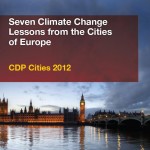 June 2012: London’s programmes to help reduce the carbon impact of the city are included in a new Carbon Disclosure Project (CDP) and Accenture study. Seven climate change lessons from the cities of Europe examines seven actions that leading European cities are taking to manage climate change in their cities. Further details on an Accenture press release and the following BusinessGreen article.
June 2012: London’s programmes to help reduce the carbon impact of the city are included in a new Carbon Disclosure Project (CDP) and Accenture study. Seven climate change lessons from the cities of Europe examines seven actions that leading European cities are taking to manage climate change in their cities. Further details on an Accenture press release and the following BusinessGreen article.
‘Ending Climate Change Begins in the City…’
 June 2012: C40 cities “infographic” on why cities are key to addressing climate change. Click here to view.
June 2012: C40 cities “infographic” on why cities are key to addressing climate change. Click here to view.
“London’s carbon reduction and climate mitigation dilemmas are complex and critical…”
June 2012: A new report outlining the imperatives for London’s future success has recently been published and contains views from around 100 leading thinkers about the future of cities into the second decade of the 21st century – including the following:
“While some challenges remain as intractable as ever, others have only surfaced more recently. The major policy area which has moved inescapably to the forefront since London:World City is that of climate change. In 1991 environmental concerns were primarily limited to air pollution, sulphur dioxide emissions, noise and litter. The implications of carbon dioxide emissions for urban life and urban policy had barely registered. Today London’s carbon reduction and climate mitigation dilemmas are complex and critical. There is increasing evidence that world cities will need to introduce rigorous climate-change-oriented provision in order to meet the security and ethical demands of an increasingly environmentally conscious citizenry.”
Research into building low carbon cities
May 2012: Researchers at four universities – including University College London – have secured a £6m grant that will help “study visions of an alternative urban future with drastically reduced CO2 emissions then develop realistic and radical engineering solutions to achieve them in a socially acceptable way.” Further information on the following ESPRC news release.
New approach to developing scenarios for future of low carbon cities
May 2012: “A new study has explored how cities can create a low carbon future by presenting an approach to stakeholder engagement that develops scenarios of an ideal city. Rather than projecting towards a low carbon target for the future, the study suggests that ‘backcasting’ to the present day from these scenarios may provide a useful goal-orientated approach to environmental planning in cities.” Read a summary of the new study here.
Europe’s future depends on cities resilient to climate change
14 May 2012: European Environment Agency (EEA) report launched considering the response required by EU cities to rising temperatures as a result of climate change. “In Europe, temperature is increasing, precipitation is changing and sea level is rising. However, the effects will not be uniform across the continent, according to the EEA report, ‘Urban adaptation to climate change in Europe‘. The report is the first Europe-wide assessment of urban vulnerability to climate change.” Read the full press release here.
How London compares to other leading cities on carbon/energy
 May 2012: The World Bank have just published a report which focuses on Chinese cities and the need for these areas of growth to respond to the challenges of climate change. The report however also provides a comparison of London against a number of other world cities, looking at a range of low-carbon metrics (emissions per capita, CO2 intensity, energy consumption per capita and so on – see Tabl3 3.1 – pg 85) which may be of interest. The World Bank news story around the release of the report is available here, and the report itself – Sustainable low-carbon city development in China – can be downloaded here.
May 2012: The World Bank have just published a report which focuses on Chinese cities and the need for these areas of growth to respond to the challenges of climate change. The report however also provides a comparison of London against a number of other world cities, looking at a range of low-carbon metrics (emissions per capita, CO2 intensity, energy consumption per capita and so on – see Tabl3 3.1 – pg 85) which may be of interest. The World Bank news story around the release of the report is available here, and the report itself – Sustainable low-carbon city development in China – can be downloaded here.
Hotting Up? An Analysis of Low Carbon Plans and Strategies for UK Cities
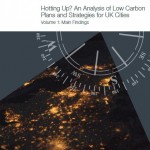 28 March 2012: Interesting – and detailed – report published by the Royal Institute of Chartered Surveyors (RICS) analysing progress by UK cities work on reducing their carbon impact through the development of climate change action plans and related actions. One of the key recommendations of the report sets out that Government should:
28 March 2012: Interesting – and detailed – report published by the Royal Institute of Chartered Surveyors (RICS) analysing progress by UK cities work on reducing their carbon impact through the development of climate change action plans and related actions. One of the key recommendations of the report sets out that Government should:
- Develop a new policy framework which recognises the role of cities in the climate change and low carbon agendas. The majority of the UK’s population lives in cities, and they are vital in providing a focus for tackling climate change and responding to the low carbon agenda through technology deployment and access to finance. A new ‘low carbon city’ framework,which builds on the existing DECC pilots, should be developed and the concepts of ‘low carbon city’ and‘low carbon society’ should be clearly defined within this framework.
The report and accompanying appendix contains significant amounts of analysis regarding London metrics on energy and carbon in relation to other cities. Download Hotting Up? An Analysis of Low Carbon Plans and Strategies for UK Cities here.
The Economics of Low Carbon Cities
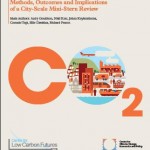 10 January 2012: This report outlines a new method for a city-scale mini-Stern review evaluating the cost and carbon effectiveness of a wide range of existing low carbon options that could be applied in households, industry, commerce and transport. The research explores the scope for the deployment of these options at the city-scale, along with an analysis of the associated investment needs, financial returns, carbon savings and implications for the economy and employment. Download the report from www.lowcarbonfutures.org. Further information here.
10 January 2012: This report outlines a new method for a city-scale mini-Stern review evaluating the cost and carbon effectiveness of a wide range of existing low carbon options that could be applied in households, industry, commerce and transport. The research explores the scope for the deployment of these options at the city-scale, along with an analysis of the associated investment needs, financial returns, carbon savings and implications for the economy and employment. Download the report from www.lowcarbonfutures.org. Further information here.
C40 Research on Importance of Cities to Climate Change
 1 June 2011: The C40 Cities Climate Leadership Group (C40) released two reports today that emphasize the critical role of measurement and transparency in tackling climate change in megacities.
1 June 2011: The C40 Cities Climate Leadership Group (C40) released two reports today that emphasize the critical role of measurement and transparency in tackling climate change in megacities.
- A measurement baseline – The first‐ever public disclosure and analysis of self‐reported community‐wide greenhouse gas emissions (GHG) data from C40 cities, showing the urban concentration of GHG emissions and climate‐related risks, highlighting the importance of City government action to reduce emissions (report by the Carbon Disclosure Project)
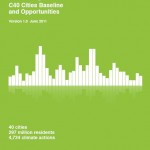 A benchmark of actions C40 Cities have taken to date and an inventory of powers Cities hold over sectors, demonstrating what actions have been taken across the C40 Cities and also identifying what powers City governments across the C40 have to take further actions on mitigation and adaptation. (report by Arup)
A benchmark of actions C40 Cities have taken to date and an inventory of powers Cities hold over sectors, demonstrating what actions have been taken across the C40 Cities and also identifying what powers City governments across the C40 have to take further actions on mitigation and adaptation. (report by Arup)
Sustainable cities – A vision of our future landscape
31 May 2011:”Cities are crucial to global sustainability. Implementing isolated initiatives which ‘reinvent the wheel’ and fail to draw on the full spectrum of skills and resources available is wasteful of resources. Regions and businesses must collaborate and share best practice or the UK as a whole will fall short of sustainability objectives. ” Download Grant Thornton’s report Sustainable cities – A vision of our future landscape here which looks at what eco-friendly cities around the world are doing, reviews a number of UK cities’ sustainability planning and development initiatives, and envisions a technology-driven sustainable city of the future.


